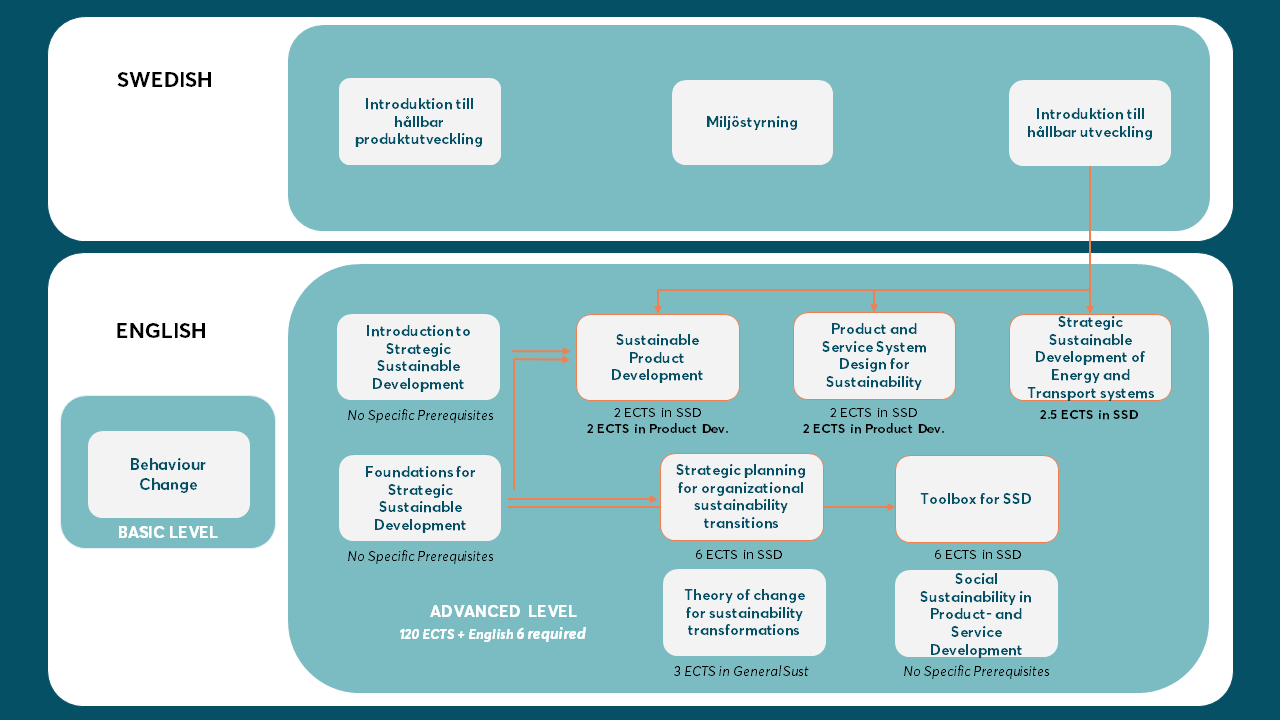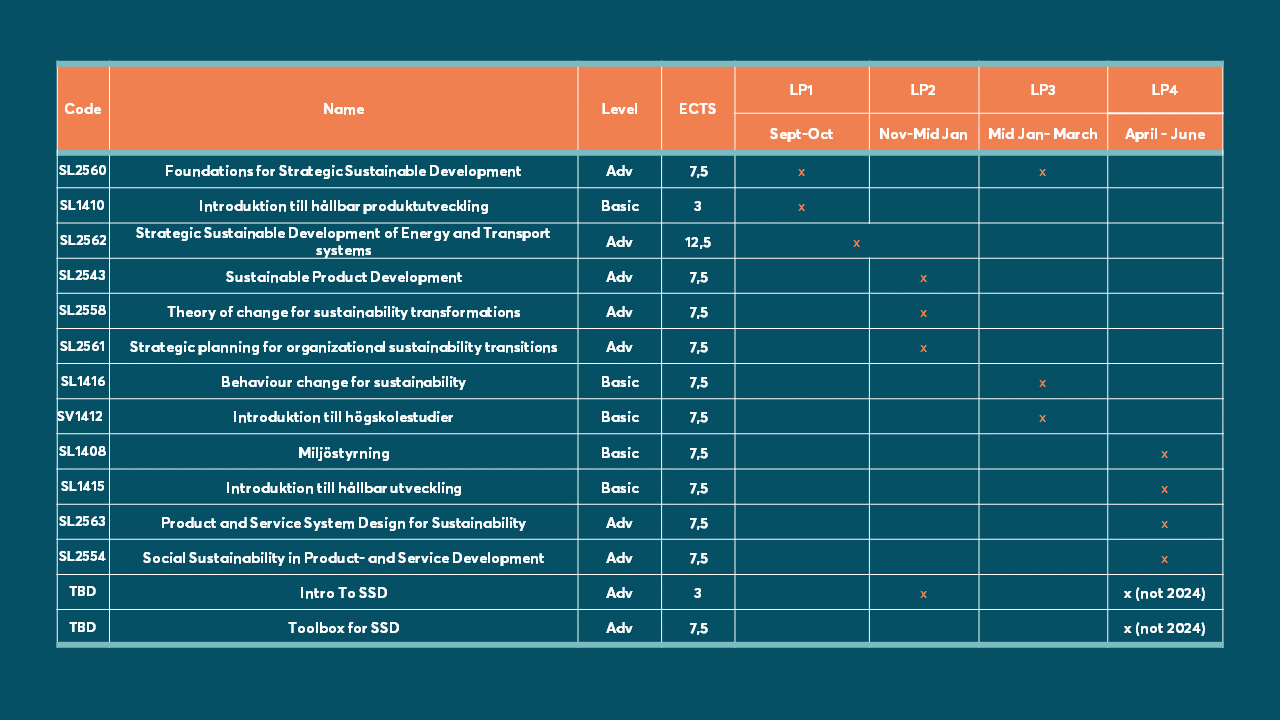Stand-alone Courses
Stand-alone courses in Strategic Leadership towards Sustainability
Our department offers many stand-alone distance courses in the field of strategic leadership towards sustainability. Education is such an important part of sustainable development and we take great care to design and develop our courses to achieve genuine learning. In most of our courses, this means live interaction with our teaching staff, lots of feedback and group projects. We look forward to you joining us on the learning journey in whichever course might suit you best.


“My biggest take away from this week is sitting in on the introductory seminar with more than 100 other fellow humans. As the urgency of the new climate regime swept me off my feet . . . Listening to the alarming facts. But this time not feeling pushed, not treated as someone who needs to be convinced. Instead, I experienced a calm and open welcoming, offering the option of looking at things in many more ways. The climate facts are clear, the work that is needed is not about finding alternative ways to interpret them. Instead, what I experienced in the setting of this course was an opening towards alternative ways of communicating and working around them. A week in, I’m feeling hopeful about adopting an attitude that I have neither shared nor had towards the crisis so far – the learning attitude.”
– Magdalena Musiala, student SL2560
Spring Semester 2025
Behaviour change for sustainability 7.5 credits (ENG)
Are you interested in learning how to support behaviour change for sustainability? We offer a hands-on, interactive course from the comfort of your own home (or wherever you like to study). You will learn some basic theory and then practise designing behaviour change interventions for sustainability. You will benefit from a mixture of live, online sessions with the teachers, time to study on your own and work in your group, totalling 20 hours per week. By the end of the course, you will be ready to use several techniques in reality.
Environmental Management 7.5 credits (SWE)
The course aims to provide basic and broad knowledge in the field of environmental management. Based on an interdisciplinary holistic integrated in a practical way, ecological, and economic aspects of the tools that can be used such as eco products, environmental accounting, and environmental management throughout. The course aims to teach how to create conditions for sustainable development, for example by increasing eco-efficiency (better sparing with resources) via the management system.
Foundations for Strategic Sustainable Development 7.5 credits (ENG)
The purpose of the course is for the student to develop 1) knowledge about, and understanding of society’s sustainability challenges and the basic reasons for these, 2) knowledge about, and understanding of a structuring and coordinating methodology for strategic sustainable development, including its scientific foundations, and 3) skills in critically reflecting on a structuring and coordinating methodology for strategic sustainable development.
Introduction to sustainable development 7.5 credits (SWE)
The course aims to provide insight into sustainable development, which includes an understanding of what sustainability challenges society has and how and by whom these can be addressed. The course also aims to provide knowledge of the basics of academic information search and a certain ability to search for, evaluate and use information in higher education studies, especially in connection with sustainable development.
Social Sustainability in Product- and Service Development 7.5 credits (ENG)
Do you want to learn more about social sustainability and develop the necessary skills to work with social sustainability related questions in a technological environment? Product and service development plays a key role in society’s transition to sustainability and the social dimension of sustainability is often forgotten. By product and service development we mean development of any type of offering, including physical products, digital products, services, and any mixture of these. Improved knowledge and skills in how to integrate social sustainability goals in product and service development makes more optimised, whole-systems solutions possible. By the end of this course you will be able to analyze social sustainability impacts of products and services from a strategic perspective and identify strategic solutions to them.
Support portfolio for strategic sustainable development 7.5 credits (ENG)
The purpose of this course is to support the students in collaboratively developing a support portfolio for strategic sustainable development. The course focuses on a general approach to structuring the exploration of various concepts, methods and tools in the sustainable development field and then exploring some of these in detail. The students should leave the course having a good overview of which tools, methods and concepts to use, what critical questions to ask, and what considerations to be aware of for implementation.
“A heartfelt thank you to Dana Bergman and the entire team at Blekinge Institute of Technology for the incredible journey through the Foundations for Strategic Sustainable Development course. The past 3 months has been an enriching experience, filled with invaluable insights that have expanded my understanding and shaped my perspective on sustainable development. Dana Bergman, your guidance has been instrumental, leading such a remarkable course.”
– Ernesto Ceron, student SL2560
Fall Semester 2025
Introduction to Strategic Sustainable Development 3 credits (ENG)
In this mostly self-paced and asynchronous course, the students will learn about (1) a background on un-sustainability, (2) sustainability and sustainable development, (3) strategic thinking and planning in the context of sustainable development, (4) a science-based definition of ecological and social sustainability and how it can be applied to create sustainability transformations. The content is similar to the first part of the 7,5 credit course Foundations for SSD.
Foundations for Strategic Sustainable Development 7.5 credits (ENG)
The purpose of the course is for the student to develop 1) knowledge about, and understanding of society’s sustainability challenges and the basic reasons for these, 2) knowledge about, and understanding of a structuring and coordinating methodology for strategic sustainable development, including its scientific foundations, and 3) skills in critically reflecting on a structuring and coordinating methodology for strategic sustainable development.
Sustainable Product Development 7.5 credits (ENG)
Building on their knowledge and skills from previous courses, students will learn how to (1) perform sustainability analysis in product development and (2) generate ideas for improvement based on the analysis. They will learn (3) advantages and disadvantages of various approaches to the above and (4) how to integrate these approaches into concept development. Competence in sustainable product development is in demand in industry and society. The course develops theoretical understanding and applied skills at the intersection of two of BTH’s areas of expertise – sustainability and product development.